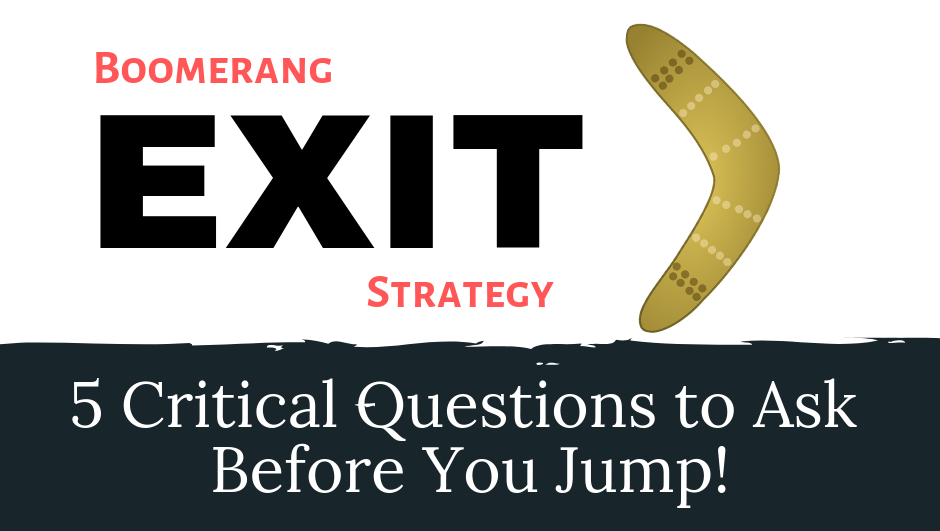You need to get out as quickly as possible. I get it. I’ve been there, and it’s a terrible place to be.
Still, if your exit strategy is a little light on the “strategy” part, you’re likely to end up right back where you are sooner than you think.
According to the 2018 Job Seeker Nation Study, 51% of people claim to change jobs every 1-5 years, up 17% since 2016. This is a significant departure from the multi-decade company loyalty we saw with previous generations, but it’s also a reflection of our society today.
A more surprising statistic is that 30% of job seekers have left a job within the first 90 days! One could argue they were courageous and self-aware enough to make a swift decision rather than waste a year trying to make it work.
While that may be true, a few thoughtful considerations could have helped them avoid the misstep in the first place.
After all, good exit strategy isn’t just about having another job lined up. It requires that you do your due diligence to ensure you don’t ultimately recreate the same or worse situation somewhere else.
Here are 5 critical questions you must ask before you jump to increase the chances of getting closer to your career bliss:
1. Why exactly do I need to get out?
You may be at the point where you dread going to work on Mondays. Dig deeper to pinpoint exactly why that is.
Perhaps you don’t love the day-to-day activities of your job. In theory the job sounded great at first. The mission or vision of the company inspired you, but it just didn’t translate to your day-to-day work, what you spend 80% of your time doing.
If this is the case, it’ll be important to understand what specific functions and responsibilities you genuinely enjoy, and which feel soul-sucking.
Maybe you don’t have the support or tools to be successful in your role. Do you have a horrible boss? Is the culture one of cut-throat competition? Are you missing critical tools and resources?
Perhaps you’re consistently sacrificing your personal priorities for your professional ones.
2. Can I turn this around?
Not every situation is salvageable, but it may be worth asking the question, especially now that you’ve identified exactly what would need to change.
Lean on your trusted champions to help guide you, brainstorm with you, or even move a few mountains to position you for success.
If there’s truly nothing that will make this job better, then at least by thinking it through, you can put lingering doubts behind you and move forward.
3. How will this new role be different?
Even if you have something lined up, don’t leave this question to chance. You run the risk of recreating your current situation and finding yourself devising another exit strategy soon.
Start talking to people. If you know someone at the company, great! Ask them the questions you’re hesitant to ask during the interview. What is the leadership like? Do you feel supported, how and why? Do you have what you need to be successful at your job? What would you change? Does the work still allow you able to honor your personal commitments?
To get the inside scoop, speak with someone within the company you’re interested. Ideally, they’re doing work similar to the role you’re seeking.
You could search for and connect with those people on LinkedIn. Ask them about their experience. If you’re already at the interview stage, don’t hesitate to ask to speak with someone in a similar role as a next step.
4. What do I need to be successful?
Think about what would need to be different this time for you to be successful. Is it more pay? Better benefits? Flexibility? Opportunity for growth? The trust and support to drive the company forward? The right team? An amazing boss who has your back and supports your professional goals?
There are 3 core components of career bliss. The first is doing work you love and are amazing at. The second is having the right working conditions to support your success. The third is that you don’t sacrifice your personal or financial priorities.
If you’re clear about your “must have” success factors, then you can be better prepared to negotiate for what you need before you take the leap.
5. In a year from now, how will I know I made the right decision?
Consider your measures of success. Beyond the 3 components of career bliss you identified above, how else will you gauge if you’re on the right path?
If truly have focused on the “strategy” part of your “exit strategy” you should see a boost in your confidence at work and in your personal life. You’ll have more energy and likely find your relationships are better, smoother and more fulfilling.
Remember these 5 simple questions the next time you devise your exit strategy, and ensure you don’t boomerang right back to where you started!

